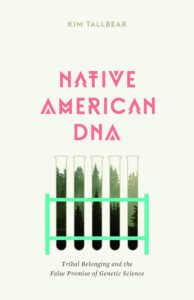NOTE: THIS WEBSITE IS A WORK IN PROGRESS. RESOURCES AND DATA ARE ADDED DAILY.
IMPORTANT: We are in urgent need of funding to keep this project alive and ensure its future. If you’re enjoying the site and see our vision for the project, please consider joining as a paid member or contributing to our crowdfunding campaign today. It is only with your help that we can continue this work.
Thanks so much for your support! – Jes
![]()
0
Native American DNA: Tribal Belonging and the False Promise of Genetic Science
Resource ID: 3156
Type: book, non-fiction
share:
Some buttons on this page link to external websites. If you visit one of our affiliate sites and make a purchase, I may receive a small commission at no extra cost to you. More info
- UPDATED: 6.29.2025
- status: in progress
- Genetics, Identity, Indigenous Issues
- DNA testing, belonging, tribal enrollment
author:
Kim TallBear
editor:
n/a
publisher:
date:
9.1.2013
ISBN:
9780816665860
pages:
256
notes:
. . .
contents:
description:
Who is a Native American? And who gets to decide? From genealogists searching online for their ancestors to fortune hunters hoping for a slice of casino profits from wealthy tribes, the answers to these seemingly straightforward questions have profound ramifications. The rise of DNA testing has further complicated the issues and raised the stakes.
In Native American DNA, Kim TallBear shows how DNA testing is a powerful--and problematic--scientific process that is useful in determining close biological relatives. But tribal membership is a legal category that has developed in dependence on certain social understandings and historical contexts, a set of concepts that entangles genetic information in a web of family relations, reservation histories, tribal rules, and government regulations. At a larger level, TallBear asserts, the "markers" that are identified and applied to specific groups such as Native American tribes bear the imprints of the cultural, racial, ethnic, national, and even tribal misinterpretations of the humans who study them.
TallBear notes that ideas about racial science, which informed white definitions of tribes in the nineteenth century, are unfortunately being revived in twenty-first-century laboratories. Because today's science seems so compelling, increasing numbers of Native Americans have begun to believe their own metaphors: "in our blood" is giving way to "in our DNA." This rhetorical drift, she argues, has significant consequences, and ultimately she shows how Native American claims to land, resources, and sovereignty that have taken generations to ratify may be seriously--and permanently--undermined.
In Native American DNA, Kim TallBear shows how DNA testing is a powerful--and problematic--scientific process that is useful in determining close biological relatives. But tribal membership is a legal category that has developed in dependence on certain social understandings and historical contexts, a set of concepts that entangles genetic information in a web of family relations, reservation histories, tribal rules, and government regulations. At a larger level, TallBear asserts, the "markers" that are identified and applied to specific groups such as Native American tribes bear the imprints of the cultural, racial, ethnic, national, and even tribal misinterpretations of the humans who study them.
TallBear notes that ideas about racial science, which informed white definitions of tribes in the nineteenth century, are unfortunately being revived in twenty-first-century laboratories. Because today's science seems so compelling, increasing numbers of Native Americans have begun to believe their own metaphors: "in our blood" is giving way to "in our DNA." This rhetorical drift, she argues, has significant consequences, and ultimately she shows how Native American claims to land, resources, and sovereignty that have taken generations to ratify may be seriously--and permanently--undermined.
peoples:
CMOS:
author-date:

